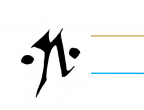Tionscadal na Nod
.r. (marginal)
Image:

Source: Dublin, Royal Irish Academy, MS 23 E 25 (1229) = Lebor na hUidre [s. xi/xii], p. 81bFile:
Letters displayed:
<r / .r.>
Base form in image, without marks, as it may appear to the untrained eye.
Represents in Irish:
rosc(?) / (marks out verse) / (marks out special text form)
In the scribe’s mind or in normalised spelling.
Appearance
Build type:
Combination
Notational device:
Baseline symbol, Critical sign
Components:
At the baseline:
Alphabetic letters:
r (regular)
Represents: r (Irish)r (Latin)
Symbols:
Homograph of:
Comments
In LU, LL and later manuscripts (e.g. Rawlinson B 488), the abbreviation .r., less commonly .R. , is sometimes written in the margin of a column of text. When it used in this way, it tends to mark out verse, especially archaic/archaised or otherwise difficult verse such as rosc, although instances are also known when it foregrounds non-poetic lines of writing.
There is no absolute certainty over what it represents, or what it represented at first, nor if its original meaning and usage went unchanged. The most common reading is rosc (or roscad), as proposed by Ernst Windisch and argued at some length by Proinsias Mac Cana, ‘On the use of the term retoiric’, Celtica 7 (1966). Mac Cana took issue with Thurneysen’s suggestion that it stands for retoiric rather than rosc. Daniel F. Melia, ‘Further speculation on marginal .r.’, Celtica 21 (1990) adds to the discussion the note of warning that the abbreviation does not signal verse exclusively, but also reported speech and lists of items (e.g. Fled Bricrenn in LU). He tentatively proposes that at one time it may have represented Latin require, asking the reader to pay attention, and perhaps that its interpretation as rosc may have been adopted at a later stage of scribal tradition. Cecile O'Rahilly, ‘Five notes: 5. Marginal .r.’, Celtica 10 (1973) also remarks on its wider usage, but instead sees rosc as the starting point for a semantic development by which it came to mark memorised textual items in general.
Meaning
Represents:
In Irish: rosc(?) / (marks out verse) / (marks out special text form)
Context










